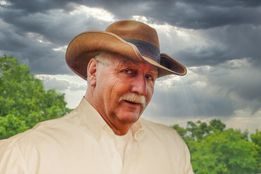
3 minute read
Dennis Doty: Behind the Chute
Deadwood’s Last Hand: A mining camp where legends lived, gambled, and died hard.
Welcome to the August issue of Saddlebag Dispatches. This month we ride into Deadwood, South Dakota—a town whose very name still echoes with the grit, gold, and gun smoke of the Old West. Our lineup explores not just the legends who walked its muddy streets, but also the largerthan-life history that continues to make Deadwood a touchstone for western enthusiasts everywhere.
We’re also proud to celebrate the winners of the 5th Annual Mustang Award for Western Flash Fiction. Last year, Laura Conner Kester claimed the trophy with her story “A Train to Catch.” This year, Brandon Barrows takes home the Mustang with his taut and memorable “A Damn Fine Day.” Our First Runner-Up is Michael R. Ritt with “The Undertaker,” and Lana Dunnaway rounds out the top three with “The Holdup.” Congratulations to all our winners, and many thanks to every entrant and judge who helped keep the spirit of western storytelling alive.
As for the rest of this issue, you’ll find an outstanding mix of history, fiction, and commentary from some of the best western authors writing today. Ben Goheen, Michael Knost, Don Money, Abigail Dotzler, and Alex Slusar contribute original works, while Billie Holladay Skelley takes us deeper into the complicated life of Martha Jane Cannary—better known as Calamity Jane. Lynn Downey explores the rise of Dude Ranching, Features Editor George “Clay” Mitchell sits down with New York Times bestselling author Chris Enss, and Regina McLemore recounts the tragic story of Lakota chief Two Sticks. Terry Alexander examines Hollywood’s portrayals of “Wild Bill” Hickok, Chris Enss first introduces us to trailblazing frontier doctor Jenny Murphy before diving into the life of Deadwood’s most notorious gambler, Poker Alice. Sherry Monahan mixes up another historic cocktail in Lively Libations, and Anthony Wood kicks off his two-part series on the infamous West-Kimbrell Gang.
But before you dive in, let’s take a moment to remember why Deadwood looms so large in the western imagination. Founded in 1876 during the Black Hills Gold Rush, Deadwood was a magnet for fortune-seekers, outlaws, gamblers, and opportunists. Its streets ran thick with mud, whiskey, and danger, and it quickly earned a reputation as one of the most infamous boomtowns of the American frontier. That reputation was sealed when James Butler “Wild Bill” Hickok—gunslinger, gambler, and legend in his own time—was shot in the back of the head during a poker game at Nuttall & Mann’s Saloon, holding what became known as the “dead man’s hand.”
Yet Deadwood was always more than lawlessness and vice. It was a crossroads of cultures, where miners and merchants, soldiers and settlers, Native peoples and immigrants clashed and cooperated in equal measure. Its saloons and brothels made headlines, but its boarding houses, mercantile shops, and makeshift hospitals built the bones of a real community. Even through devastating fires, epidemics, and economic crashes, Deadwood endured—and today it stands as one of the most vividly preserved towns of the Old West, a place where history hasn’t been paved over but still rides the wind through the gulch.
As we continue into our second decade, Saddlebag Dispatches remains committed to bringing you stories that embody that same rugged spirit—tales of struggle, survival, and the search for opportunity at the edge of civilization. Thank you for riding with us through the years. We’re proud to keep the campfire burning bright and look forward to many more trails ahead.
So pull up a log, pour yourself a hot cup of coffee from the camp pot, and enjoy the very best in western reading.
Dennis Doty, Publisher










